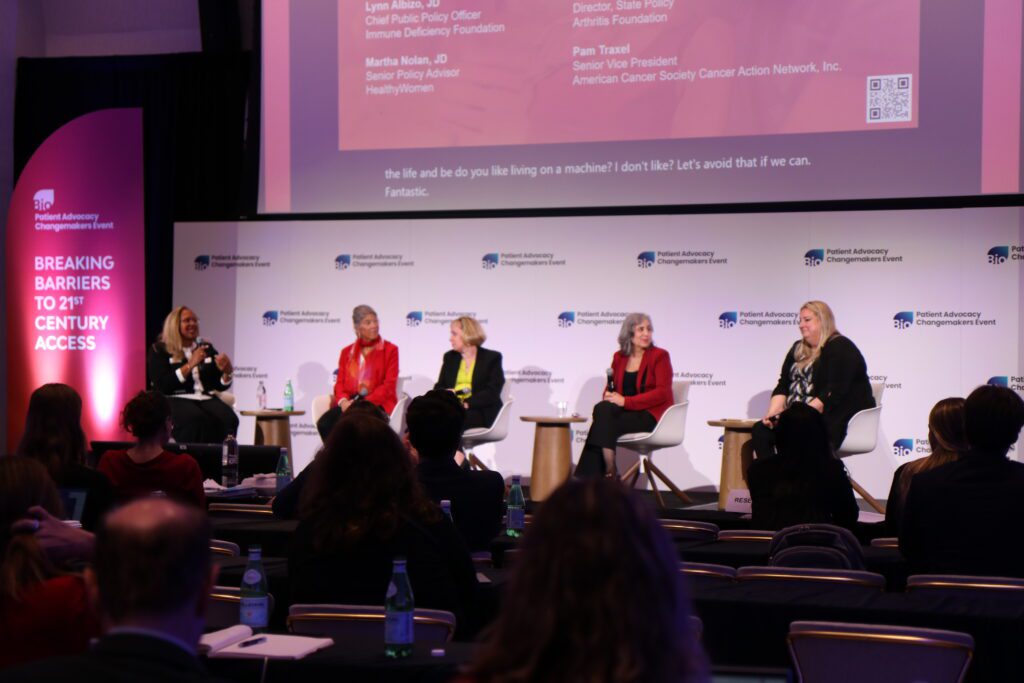The post-COVID era has not been kind to legislation supportive of vaccines, on either the state or the federal level. But advocates have persisted in working to both educate lawmakers on the benefits of vaccine programs, as well as expand access to vaccines for the patient communities that need them most.
“We are here today to talk about the intersection of vaccines and the patient advocacy community in particular,” said Phyllis Arthur, Executive Vice President & Head of Healthcare Policy and Programs at the Biotechnology Innovation Organization (BIO), introducing a vaccines panel during the 2025 BIO Patient Advocacy Changemakers Event, or PACE.
“We also want to talk about how we think about vaccines and immunization as part of the overall battle to make sure public health is well represented and protects us all,” she continued, “particularly those who might be vulnerable to bad outcomes for infectious disease.”
Vaccine policy, legislation, and development are intimately intertwined with good patient outcomes, the panelists discussed. And advocates are at the helm of protecting access.
Interview with Pam Traxel, Senior Vice President at the American Cancer Society Cancer Action Network, at PACE 2025
Why education matters
Several things this year have mobilized advocates to try to protect vaccine access at the state and federal level, Arthur explained: vaccine skepticism in leadership; the transition of the Food and Drug Administration (FDA) playing the role of recommending body, versus just regulatory body (to the COVID vaccine in particular); big changes to the Advisory Committee on Immunization Practices (ACIP); movement to eliminate school requirements altogether in several states.
And with these ever-growing challenges, advocates are working hard to turn the tide. To do so, panelists noted, they have to lead with education when talking to policymakers—both when it comes to the science behind vaccines, and the benefits to patient populations.
Pam Traxel, Senior Vice President at the American Cancer Society Cancer Action Network, explained two reasons why advocates are interested in vaccines.
“One is we look forward to the development of vaccines that will prevent people from getting cancer,” she said.
The other is protecting cancer survivors. “For the nearly 18 million cancer survivors and thrivers in our country, living in a space where you have herd immunity is really, really important,” she said, “particularly for patients who have blood cancers. They’re at incredibly high risk of some really serious consequences if they are exposed to some of these common diseases, like measles or even COVID.”
Lynn Albizo, Chief Public Policy Officer of the Immune Deficiency Foundation, explained the perspective of the immunocompromised patient population: community vaccinations are an act of overall community care.
“Some of our community can’t even be vaccinated because they can’t have live vaccines,” she explained, “but that means that the people around them need to be vaccinated so that they can be protected.”
Yet this is a reality that few non-immunocompromised people realize, showing the importance of education. As all of the panelists noted, telling patients’ stories is key to effective advocacy.
Make it human
“People who are immunocompromised have very bad outcomes if it turns out that they catch a disease that is preventable by vaccines,” said Albizo. In fact, many of the patients Albizo has worked with found out that they were immunocompromised as a result of catching a vaccine-preventable communicable disease.
And it is not just seasonal vaccinations that people have to keep up with.
“People often assume, Oh, well, you got vaccinated when you were young, so you’re not going to get X disease,” Albizo noted. “But it’s still important to remember that when we start having lower vaccination rates, that people understand that those old childhood viruses are still out there and they may still be vulnerable to them, even if they have been vaccinated.”
“Just making it human is key,” added Melissa Horn, Director of State Policy at the Arthritis Foundation. “Emphasizing the patients’ stories is so critical. I often wear two hats whenever I speak at these things, because I am a patient as well.”
“I will say the sickest I’ve ever been has not been from one of the three cancers that I had,” explained Horn. “It was when I got a virus, and I ended up in the ICU on a ventilator. That was also the most expensive medical experience of my life. One day on a ventilator costs $111,000. I also lost my job because I cost too much money and didn’t have the FMLA protection because I worked for a company that was less than 50 people. These are the kinds of real-life situations that people with chronic disease are scared of. It’s not just the cancer diagnosis or arthritis; it’s these acute events that could be prevented.”
Forgetting the past, missing out on the future
As Traxel explained, vaccine history goes back much further than many realize. In fact, the smallpox vaccine was created in 1796.
“They’ve been around a really long time,” she said. “And yet now, we’re having this really, I think, awkward conversation. Reminding people about the depth and breadth of vaccines is really important, because when we see this come out in policy, whether it be federal policy or state policy, these are broad bans and limiting access without really evaluating what we’re really talking about.”
What if, Traxel posits, a biotech company creates a cure for a cancer, but it happens to be a vaccine? It is not outside of the realm of possibility. “How do we make sure that people can have access to that?” Traxel asks. “This is really about educating and broadening the lens so that it doesn’t just become about one or two vaccines.”
The thing that scares Traxel the most is the potential that a life-saving vaccine might not be developed because of the current landscape. “I am scared that a biotech might say, I don’t think I’m going to get the venture capital, or even, If we got this vaccine through the science, it still wouldn’t be covered, and so people would have to pay cash for it, and the economic model doesn’t work. That’s devastating, whether it’s for cancer or some other condition.”
Navigating the conversation
With vaccines being such a hot-button topic, it’s important to meet lawmakers where they are and speak in a language they understand.
“On the right, they don’t really want to hear as much about herd immunity and public health,” observed Albizo. “But what does resonate with them is looking at individual rights. So, we often break down these big numbers, but then bring it back to the fact that that means something very small. That means somebody in your circle will be impacted.”
If you can get a foot in the door, have whatever conversation you can and try to keep it going. “It obviously depends on who you’re talking to, in what environment, and if you get the opportunity to even have a conversation,” Horn said. “I don’t ever really like going at it alone. Especially because this can be a trigger subject. But also, you need to have the stakeholders all in the same room. And I actually think this is one of those issue areas where having coalitions is effective.”
In the case of insurers, they are rarely interested in reducing their vaccine coverage because it saves money. “They’re like, We’re not changing our vaccine coverage because it saves a lot of money if you don’t get sick from one of these diseases, or even have an acute situation where you’re in emergent care or intensive care,” noted Horn. “They definitely see the advantage.”
Now, the key is to help those in the driver’s seat rediscover the advantage of vaccines, too.




